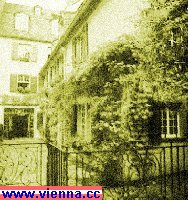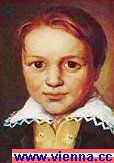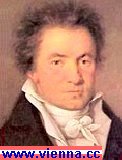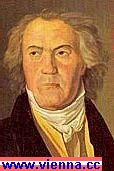 Beethoven's
biography, overview of Beethoven's life Beethoven's
biography, overview of Beethoven's life
Ludwig van Beethoven was probably born on December 16, 1770 in Bonn / Germany
as son of the well-known tenor singer Johann van Beethoven of the court
orchestra in Bonn and his wife Maria Magdalena (orig.name Keverich). The date
cannot be determined exactly, anyway on December 17, 1770 he was baptized.
He played music starting in his early childhood. Due to his musical talent he played concerts in Cologne (academy concert) in
1778 and 1781 in Holland. Success was moderate, hopes for a wonderchild like
Mozart remained unfulfilled.
Starting from 1779 he received musical training by Christian Gottlob Neefe,
musical director and court organist in Bonn. 1781 he stopped education and
traveled with his mother to Rotterdam.
 1782
his first works were printed, i.e. "Variationen pour le Clavecin sur un
Marche de Mr.Dresler". 1782 he was allowed to play as substitute for his
teacher and received employment as "Akkompagnist" (accompanying
musician) on viola and Cembalo. 1783 3 pianosonatas were published and Neefe
wrote in March 1783 in "Magazin der Musik" (magazine of music) of a
"second Mozart". 1782
his first works were printed, i.e. "Variationen pour le Clavecin sur un
Marche de Mr.Dresler". 1782 he was allowed to play as substitute for his
teacher and received employment as "Akkompagnist" (accompanying
musician) on viola and Cembalo. 1783 3 pianosonatas were published and Neefe
wrote in March 1783 in "Magazin der Musik" (magazine of music) of a
"second Mozart".
1787 Beethoven traveled to Vienna to get taught by Wolfgang
Amadeus Mozart. But as his mother
heavily got sick he returned to Bonn. After his mother's death on July 17, 1787
his father became a drunkard, he was placed under tutelage (guardianship).
Finally Ludwig now had full responsibility for the family. Of seven children
only Ludwig and his brothers Kaspar Anton Karl and Nikolaus Johann survived.
1789 Beethoven visited academic lectures and received financial support by
sponsors. 1790 he became acquainted with Joseph Haydn.
1792 Beethoven's father died, the cure prince authorized further salary
payments. In November 1792 Ludwig van Beethoven traveled with a scholarship of
cure prince Maximilian Franz to Vienna. Count Ferdinand von Waldstein introduced
the composer to the noble society. In addition he was taught by Joseph Haydn and
traveled with him to Eisenstadt 1793. But the two composers did not understand
each other well (Haydn did not correct Beethoven's errors). Beethoven meant,
Haydn was envious on Beethoven because of his talent and did not want to support
him. The truth is that Haydn was impressed by Beethoven's talent, as he wrote a
letter to Bonn cure prince. Haydn wrote: "Connoisseurs and non-connoisseurs
must admit from present works that Beethoven will represent the place of one of
the largest musicians in Europe, and will be proud, to call myself his
master". Haydn asked Beethoven to write on his worls "student of Haydn",
but Beethoven rejected this. Beethoven changed his mind upon Haydn only after
his death. He secretly got taught by composers, for instance Johann Baptist
Schenk, Johann George Albrechtsberger and Antonio Salieri. As French troops
occupied the cure principality Cologne in 1794 Beethoven could not return home
and so he remained in Vienna.
Cure prince Maximilian stopped 1794 further payments to Beethoven. Beethoven
made money with piano hours.
1795 Beethoven played in the theatre Burgtheater his B major concert Op. 19
and Mozart's D minor concert in favor of Mozart's widow Constanze. On May 19,
1795 Carlo Artaria committed for 212 fl. to publish Beethoven's first Opus work.
Beethoven personally advertised in the Viennese newspaper Wiener Zeitung a copy
for one florin.
Beethoven made his money as free composer and music teacher, as for duke
Rudolf. He also received money from sponsors, for example in 1800 an annual
salary of 600 florin. Therefor he dedicated his works aristocrats. Beethoven's
"van" in his name was not of noble origin, which he had to admit
painfully. His sponsors were among others: Prince Karl Lichnowsky (dedicated
pianotrios, published as op.1), count Franz von Brunsvik, count Rasumowsky
(Russian Ambassador in Vienna), prince Lobkowitz (he dedicated 5. and 6.symphony
to Rasumowsky and Lobkowitz), prince Nikolaus Eszterházy (Beethoven composed
the mass in C major Op. 86 for him), duke Rudolph (composition pupil, Beethoven
composed the Missa solemnis Op. 123 for him).
Beethovens financial situation worsened, since also the aristocrat circles
lost influence and fortune.
Around 1795 his hearing began to worsen, the deafness (Ostosclerose) became
worse. Beethoven undertook cures and took medicines against deafness. Due to his
illness Beethoven withdrew himself more and more. He frequently changed
dwellings.
1796 and 1797 he toured to Berlin, Nuernberg, Pest and Pressburg
(Bratislava).
 1801
Beethoven had an eye upon his 17-year old piano pupil countess Julietta
Giuccariardi, cousin of Brunsvik. A love affair is not known. 1801
Beethoven had an eye upon his 17-year old piano pupil countess Julietta
Giuccariardi, cousin of Brunsvik. A love affair is not known.
At the end of April 1802 Beethoven moved to Heiligenstadt by recommendation
of his doctor Professor Adam Schmidt. Heiligenstadt was a suburb of Vienna and
today it is the name of 19th Viennese district. There he wrote a farewell letter
on October 6 and 10, 1802 to his brothers, the so-called "Heiligenstaedter
Testament".
1804 tried Beethoven his (love)luck with the widow Josephin of Brunsvik.
1808 Beethoven was offered a job in Kassel / Germany. Duke Rudolph, Ferdinand
Kinsky and prince Franz Joseph Lobkowitz fixed contractually to Beethoven a
lifelong pension of 4000 florins annually, which was strongly cancelled however
by the inflation 1811. On December 22, 1808 the Symphonys 5 and 6 were first
performed in Theater an der Wien.
Until 1809 Beethoven wrote 5 piano concerts.
1810 received a rebuff for his merriage-proposal to Theresa Malfetti, sister
of Josephin von Brunsvik. In the same year he was on cure stay in Baden (near
Vienna), Franzensbaden and Teplitz.
1812 he composed the 7th.symphony.
1813 there was another cure stay in Baden.
 1815
he played concerts for the Viennese congress. Brother Karl Anton died on
November 15, 1815. Beethoven carried on a lawsuit with his sister-in-law Johanna
Beethoven (born name Reiss) around the custody for nephew Karl. In summer
Beethoven cured again in Baden. 1815
he played concerts for the Viennese congress. Brother Karl Anton died on
November 15, 1815. Beethoven carried on a lawsuit with his sister-in-law Johanna
Beethoven (born name Reiss) around the custody for nephew Karl. In summer
Beethoven cured again in Baden.
From 1816 Beethoven used hearing machines by Maelzel.
From 1819, Beethoven was now completely deaf, his friends already had left
him and visitor's communication with Beethoven only went through writing in
books called Konversationshefte (communication books).
1821 he had jaundice. A cure stay in Johannesbad followed.
 1824
his 9th symphony was first performed in Kaerntnertortheater, Beethoven never
heard it. 1824
his 9th symphony was first performed in Kaerntnertortheater, Beethoven never
heard it.
From 1825 Beethoven suffered from cirrhoses of the liver, pneumonia, dropsy,
leg swelling, four operations did not help.
On March 24, 1827 Beethoven received extreme unction and died on March 26,
1827 around 17h45 in Schwarzspanierhaus, today Vienna 19, Schwarzspanierstrasse
15. The house is not original any more. The painter Josef Danhauser took the
death-mask. Three days later the funeral celebration took place in the church
Dreifaltigkeitskirche in Alserstrasse and at the cemetery in Waehringen, today
18th Viennese district. Thousands of Viennese came, the Viennese poet Franz
Grillparzer wrote the funeral operation the actor Heinrich Anschuetz held. On
June 22, 1888 the bones were transferred to an honour grave at the Viennese
cemetery Zentralfriedhof.
As cause of death lead poisoning is assumed. Scientists of the Argonne
National Laboratory (US state Illinois) and the McCrone Research Institute in
Chicago found that out due to a hair analysis. Beethoven probably had drunk cure
water during his cure-stays, which was strongly plumbiferous. Beethoven was
embittered over his deafness and isolation and drank wine more and more. The
administrator of the estate Stephan of Breuning auctioneered the inheritance for
1,000 florins.
Immortal beloved Beethoven...
 Home - Vienna - Photos
- Music - Traveltips
- Tours - Boattrip
- Coffeehouse - Heuriger/Wine
- Links - Search - About
Home - Vienna - Photos
- Music - Traveltips
- Tours - Boattrip
- Coffeehouse - Heuriger/Wine
- Links - Search - About
| ![]() Home - Vienna - Photos
- Music - Traveltips
- Tours - Boattrip
- Coffeehouse - Heuriger/Wine
- Links - Search - About
Home - Vienna - Photos
- Music - Traveltips
- Tours - Boattrip
- Coffeehouse - Heuriger/Wine
- Links - Search - About